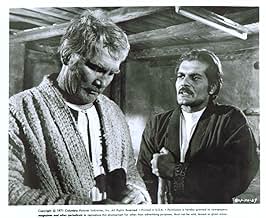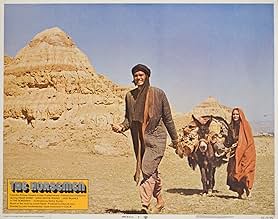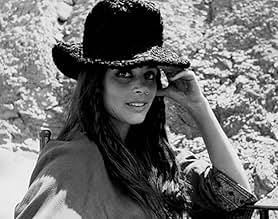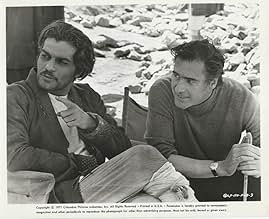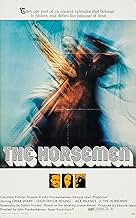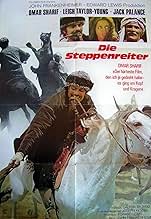IMDb RATING
6.2/10
1.4K
YOUR RATING
Drama depicting rural life in contemporary Afghanistan and the Afghani people's love for an ancient traditional sport similar to horseback polo.Drama depicting rural life in contemporary Afghanistan and the Afghani people's love for an ancient traditional sport similar to horseback polo.Drama depicting rural life in contemporary Afghanistan and the Afghani people's love for an ancient traditional sport similar to horseback polo.
- Director
- Writers
- Stars
Salmaan Peerzada
- Salih
- (as Salmaan Peer)
Aziz Resham
- Bacha to Ghulam
- (as Aziz Resh)
Vida St. Romaine
- Gypsy Woman
- (as Vida St Romaine)
Florencio Amarilla
- Arabian Man
- (uncredited)
Ishaq Bux
- Amjad Kahn
- (uncredited)
Carlos Casaravilla
- Messenger
- (uncredited)
- Director
- Writers
- All cast & crew
- Production, box office & more at IMDbPro
6.21.4K
1
2
3
4
5
6
7
8
9
10
Featured reviews
An underrated Masterpiece - entertaining AND Educational.
There is so much of interest in this compelling film, set in Afghanistan. Based on the book by Joseph Kessells, a writer of rare insight.
Centered around the ancient game of Buzkashi, played on horseback, and only in the three northern provinces of Mazar-i-Sharif, Maimana and Kataghan. [The game had it's origin in a training routine instituted by Ghengiz Khan, which both conditioned his men for warfare and provided a means of feeding his army. A very large circle was formed by his warriors and as the circle closed no animal was permitted to escape.]
There are some terrific scenes of the first "Royal Buzkashi" played on Bagrami Plain, just outside Kabul, which had been decreed by the king. Also some great footage of the country, depicting the beautiful and varied terrain encountered as Uroz makes the self-imposed and dangerous journey back to his home province in the North.
The interplay of all the characters is an education in understanding the powerful role human emotion and upbringing play in all our lives, as both Tursen(the father) and Uroz(the son) attempt to come to terms with their own harsh anger and pride. The consequences spill over and embroil other individuals in the story. The story also gives some insight into the different way of thinking engendered by the cultural mix of religion,relatively isolated living, and living in a harsh environment where survival can be pretty raw.
Contrast is drawn by the mix of ancient and modern. One such scene has Tursen (Jack Palance),who as Head of Osman Bey's stable is addressing the chopendoz,(players of Buzkashi), pauses to look upwards at a jetliner passing overhead whilst he stands on "The Roof of the World". Another takes place in the modern hospital in Kabul.
Both Palance & Sharif give of their finest, very well supported by a great character cast.
A dramatic part of the story unfolds in the Bamian Valley, where Uroz gambles & loses the very thing he later realise he loves and wants back. Historically this part of the film contains important footage of the giant Budhas that were carved into the cliffside, until deliberately destroyed by Talliban militia.
All in all, an excellent and enjoyable film and I am surprised it has not been shown on Television or re-issued on disc, as the world focussed on that area just a short time ago.
Centered around the ancient game of Buzkashi, played on horseback, and only in the three northern provinces of Mazar-i-Sharif, Maimana and Kataghan. [The game had it's origin in a training routine instituted by Ghengiz Khan, which both conditioned his men for warfare and provided a means of feeding his army. A very large circle was formed by his warriors and as the circle closed no animal was permitted to escape.]
There are some terrific scenes of the first "Royal Buzkashi" played on Bagrami Plain, just outside Kabul, which had been decreed by the king. Also some great footage of the country, depicting the beautiful and varied terrain encountered as Uroz makes the self-imposed and dangerous journey back to his home province in the North.
The interplay of all the characters is an education in understanding the powerful role human emotion and upbringing play in all our lives, as both Tursen(the father) and Uroz(the son) attempt to come to terms with their own harsh anger and pride. The consequences spill over and embroil other individuals in the story. The story also gives some insight into the different way of thinking engendered by the cultural mix of religion,relatively isolated living, and living in a harsh environment where survival can be pretty raw.
Contrast is drawn by the mix of ancient and modern. One such scene has Tursen (Jack Palance),who as Head of Osman Bey's stable is addressing the chopendoz,(players of Buzkashi), pauses to look upwards at a jetliner passing overhead whilst he stands on "The Roof of the World". Another takes place in the modern hospital in Kabul.
Both Palance & Sharif give of their finest, very well supported by a great character cast.
A dramatic part of the story unfolds in the Bamian Valley, where Uroz gambles & loses the very thing he later realise he loves and wants back. Historically this part of the film contains important footage of the giant Budhas that were carved into the cliffside, until deliberately destroyed by Talliban militia.
All in all, an excellent and enjoyable film and I am surprised it has not been shown on Television or re-issued on disc, as the world focussed on that area just a short time ago.
Not A Book That Lends Itself To Cinema
This is an example of taking a book and adapting it to the large screen and realising with hindsight that it works better as a book . I'm not familiar with Joseph Kessel's original novel but the comments on this page state that the film is very faithful to the book and that might be the problem . It's a story that concentrates on obsession at winning at all costs and Uraz the protagonist is a universal metaphor for all mankind that when you want to win something it can cost you very dearly
You can perhaps see why the producers thought this would make a great film with its exotic locations and the fact it was st in Afghanistan before the land reforms the mid 1970s that led to civil war and the subsequent Soviet intervention is what made me seek out the film if only to understand Afghan culture better and the film does contain an intelligent opening when the audience are led to believe they're watching a scene from the 17th Century only to the Afghan rug pulled from under their feet as a jet plane screams over head . Likewise there's some spectacular scenes involving the sport of buzkashi where horsemen literally fight over the carcass of a dead goat and there's some impressive cinematography featuring the Afghan landscape but the inherent problem with the film is the character driven narrative which doesn't kindly lend itself to the medium of cinema
You can perhaps see why the producers thought this would make a great film with its exotic locations and the fact it was st in Afghanistan before the land reforms the mid 1970s that led to civil war and the subsequent Soviet intervention is what made me seek out the film if only to understand Afghan culture better and the film does contain an intelligent opening when the audience are led to believe they're watching a scene from the 17th Century only to the Afghan rug pulled from under their feet as a jet plane screams over head . Likewise there's some spectacular scenes involving the sport of buzkashi where horsemen literally fight over the carcass of a dead goat and there's some impressive cinematography featuring the Afghan landscape but the inherent problem with the film is the character driven narrative which doesn't kindly lend itself to the medium of cinema
A true gem!
This is a human condition action adventure that takes place in modern time( meaning 1971) Afghanistan. The film starts by showing how far back in time they are. Everybody is riding around on horses while planes are driving above them. In this country a proud (the best word would be prince but it doesn't exactly fit) Uraz (played by Omar Sharif, mostly known as that guy who had the lead in Doctor Zhivago) sets out to this weird horse tournament on the request of his father, a elderly clan leader and master of the sport played by the great Jack Palance.
It's made obvious from the start that though this man might be proud and even quite noble (he always bets on the weakest), he is in fact cruel to servants and have a rather nihilistic view on life. When he manages to fall off his horse and break his leg he feels a great dishonor and sets out to find the hardest and deadliest road home. On the way everything that is good in humans are questioned! The film has a very different view of the world than most others, at least this early in cinema. Many of the characters are so shady it will almost make you sick. I must say that I did not like these people as humans, though I did like their characters, inhuman behavior and cruelty is something I take a huge interest in. For those of you who enjoy to travel to different worlds and can enjoy and love films even if they perhaps have a different stand than your world view, this is the film for you.
I was quite taken by it I must say. My second favorite Frankenheimer picture to date, meaning that I thought it was better than great films such as The Manchurian Candidate, The Train and Seven Days in May. The colors are great and the mood and pacing is very intense. Most of the frames are quite beautiful. The acting is very good! And it's philosophy as a whole is rather good too but I will not give away anything about how this film turns out but I will say that I thought it was fabulous. A genius film! A masterpiece! You should definitely check it out. A true gem!
It's made obvious from the start that though this man might be proud and even quite noble (he always bets on the weakest), he is in fact cruel to servants and have a rather nihilistic view on life. When he manages to fall off his horse and break his leg he feels a great dishonor and sets out to find the hardest and deadliest road home. On the way everything that is good in humans are questioned! The film has a very different view of the world than most others, at least this early in cinema. Many of the characters are so shady it will almost make you sick. I must say that I did not like these people as humans, though I did like their characters, inhuman behavior and cruelty is something I take a huge interest in. For those of you who enjoy to travel to different worlds and can enjoy and love films even if they perhaps have a different stand than your world view, this is the film for you.
I was quite taken by it I must say. My second favorite Frankenheimer picture to date, meaning that I thought it was better than great films such as The Manchurian Candidate, The Train and Seven Days in May. The colors are great and the mood and pacing is very intense. Most of the frames are quite beautiful. The acting is very good! And it's philosophy as a whole is rather good too but I will not give away anything about how this film turns out but I will say that I thought it was fabulous. A genius film! A masterpiece! You should definitely check it out. A true gem!
Action adventure in Afghanastan: needs to become a DVD!
An excellent adaptation of the Book by Joseph Kessel; centered on the running of the first Buskashi in Kabul by the King of Afghanistan circa the 1950s. I have read the book in its English translation(1968) and seen the Movie on VHS.(1671) The movie is very fresh and not dated; and all the more compelling due to recent liberation from Arab control of that country. Footage of the Buskashi just has to be from a real game. The games were played at Bagram (Bagrimi) the plain above Kabul which was made an airport in recent years.
The author, Kessel can be compared to Joseph Conrad and Hemmingway as he apparently lived what he wrote. The book has themes just as penetrating as "Heart of Darkness" or "the Old man and the Sea" and much has translated well to this Movie. The acting is well done and convincingly. Local color shots were done in the late sixties giving this film a truly timeless feeling with little motor traffic evident.
One inspired scene has Jack Palance as Chief breeder and legendary Horseman, interrupted in his instructions to his team by the noise of a Jet; and looking up to see contrails above.
This is a real treasure just begging to be on DVD.
The author, Kessel can be compared to Joseph Conrad and Hemmingway as he apparently lived what he wrote. The book has themes just as penetrating as "Heart of Darkness" or "the Old man and the Sea" and much has translated well to this Movie. The acting is well done and convincingly. Local color shots were done in the late sixties giving this film a truly timeless feeling with little motor traffic evident.
One inspired scene has Jack Palance as Chief breeder and legendary Horseman, interrupted in his instructions to his team by the noise of a Jet; and looking up to see contrails above.
This is a real treasure just begging to be on DVD.
Better-- much better than average
Omar Sharif and Jack Palance may be the only names in this cast that most will recognize but the story based on an Afghan tale, set in Afghanistan before the Russian invasion, is a classic tale which lays out a great deal of Afghan culture during the period before the great disruption by the West. Afghanistan returned to the public eye after the post-911 invasion to depose the Taliban but the state of knowledge about these marvelous independent people who fought the British Empire to a standstill, still remains obscure. The game of buzgashi, a kind of polo for Weidman, was the core for many of the tribesmen. Its importance as an institution marking the status of tribes and individuals has no real counterpart in Western culture, and this is a tale of intrigue and self-learning, framed in a cultural setting we still have yet to understand.
Did you know
- TriviaThe film began shooting using 65mm negative (Super Panavision), but during production Columbia Pictures went through a change in management. The budgets for this and another 65mm production, Mackenna's Gold (1969), were cut and both films were forced to switch over to 35mm anamorphic Panavision. However, both were released in 70mm, with the later-shot sections blown up. In later years, the mix-and-match formats made restoration of the films more time consuming and expensive than if they'd been shot entirely in 65mm, and they were preserved in 35mm only.
- GoofsWhen Tursen (Jack Palance) has a flashback to one of his past victories, one can tell that he is swinging a phony, lightweight, stuffed goat carcass around when his horse jumps up on the mud hut.
- Quotes
District Chief: What demon has possessed you to mock these good people with that piece of dog-bait?
- How long is The Horsemen?Powered by Alexa
Details
- Release date
- Country of origin
- Official site
- Language
- Also known as
- Konjanici
- Filming locations
- Afghanistan(Exterior)
- Production companies
- See more company credits at IMDbPro
Box office
- Budget
- $6,000,000 (estimated)
- Runtime
- 1h 49m(109 min)
- Sound mix
- Aspect ratio
- 2.35 : 1
Contribute to this page
Suggest an edit or add missing content



